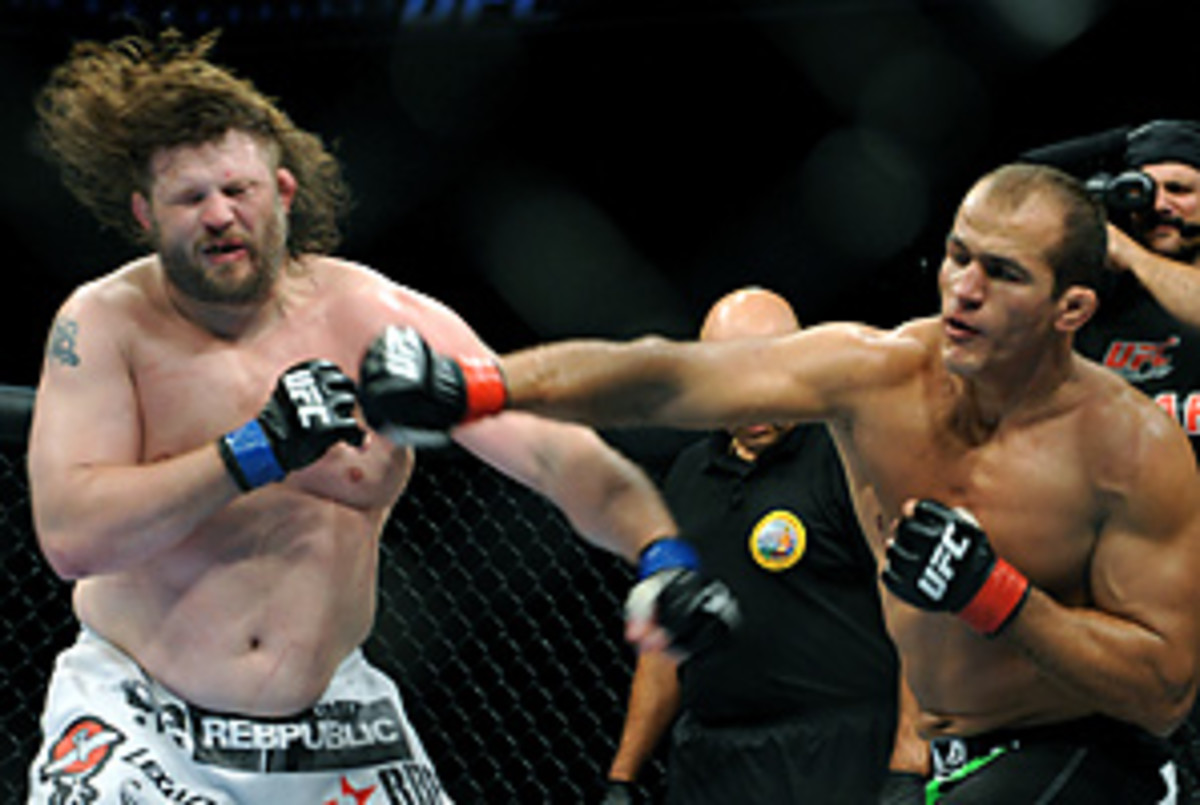Hard decisions, big consequences
The life of a pro fighter is filled with tough decisions. From who to fight next or which obnoxious Vegas nightclub to host your after-party at, there's always some pressing dilemma coming down the pipe.
But recently top UFC contenders have found themselves facing what might be the most difficult and most important decision of their careers.
It happens when they've finally earned what every fighter covets: a shot at the title. They've cleared a path to the top of the mountain, are poised to make the final push for the summit, then all at once the peak disappears into the fog. The champion goes down with an injury -- a bad one, too. There's talk of surgery, rehab. The fight could be postponed anywhere from six months to a year, and your boss wants to know whether you'll risk a lesser fight in the meantime or insist on waiting for the champ to heal.
Either way you decide to go, pitfalls abound.
Take heavyweight contender Junior dos Santos, for example. After pummeling Roy Nelson to win a shot at UFC gold against newly minted champion Cain Velasquez, he was told that he could either sit on the shelf while Velasquez worked his way back from a shoulder injury, or else he could take a coaching job opposite Brock Lesnar on 'The Ultimate Fighter' and put his title shot on the line against one of the most imposing figures in the heavyweight division.
For those with short memories -- the people who only remember Lesnar as the man who wilted under the pressure from Velasquez and not as the behemoth who beat Frank Mir, Randy Couture, and Shane Carwin -- maybe it sounds like an easy decision.
But while Velasquez exposed some holes in Lesnar's game when he took the UFC title from the former pro wrestling star, don't be fooled into thinking that a fight with the big man is nothing more than a way to stay busy in the interim. That's the kind of thinking that will get you smashed back into the middle of the pack, where you'll likely spend the next few months second-guessing yourself.
At the moment it's JDS who has everything to lose. All his 'next big thing' potential will be quickly forgotten if he loses to Lesnar, and the UFC will be perfectly content to see their most reliable pay-per-view draw get another crack at the title.
That's why the decision to fight instead of wait is always a tricky one for top contenders. For instance, take a look at the recent cautionary tale of Josh Grispi, who up until a couple of weeks ago was the number one contender for the newly created UFC featherweight championship.
When title-holder Jose Aldo got hurt, Grispi opted to take a fight with Dustin Poirer on the UFC 125 undercard. Fifteen minutes later he was battered and beaten, skulking back to the locker room after one of the briefest stays at the top in UFC history.
Maybe that's why current light heavyweight contender Rashad Evans has opted to play the waiting game. By the time his shot at current 205-pound champion Mauricio "Shogun" Rua rolls around, Evans will have spent nearly a year out of action. That means nearly a year with no fight purses rolling in, and year out of the headlines and away from the spotlight. It also means risking the dreaded cage rust, since no matter how hard you train in the gym throughout the week it's nearly impossible to simulate what it's like in the Octagon on a Saturday night.
There's also, for better or worse, the stigma that goes with the decision to wait. Jumping up and taking a fight while the champion recovers might be a risk to your standing atop the division, but it will inevitably get you the 'real fighter' label from UFC president Dana White, who loves guys who are willing to lay it all on the line, even when they probably shouldn't.
But if you're Evans, why risk it? Why fight again just to gain the distinction that you already earned? Aside from the short-term cash and an 'atta boy' from the UFC brass (which, it should be noted, holds little market value), what is there to gain?
It all comes down to why you're in this business in the first place. If it's because you want to win that belt and hold on to it until someone pries it from your grasp, then it makes sense to wait. If it's because you want to collect paychecks and smash faces, or to prove over and over again what a fearless warrior you are, title or no, then you might as well fight.
In a sport where everything, from your rise to your fall, is sped up to match the brief lifespan of your career, it's how you handle these decisions that can make all the difference. Dos Santos has made his choice. Now there's a monster with a crew-cut waiting to help him find out if it was the right one.






